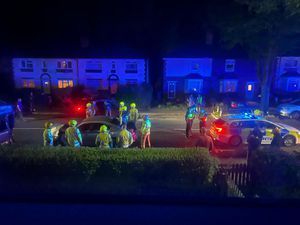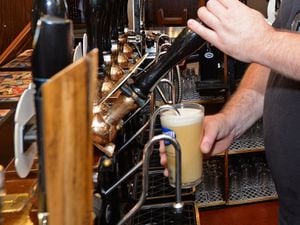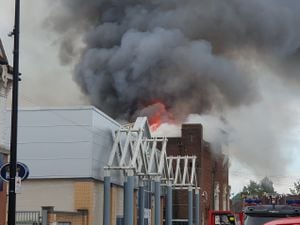Are we heading for local lockdown? Region's leaders dismiss 'hotspot' data
Could the Black Country be at a tipping point on the prospect of a local lockdown?
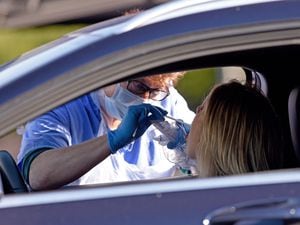
Academics suggested over the weekend that Wolverhampton and Dudley were second only to Leicester as being potential coronavirus "hotspot sites", naturally leading to speculation they could follow the East Midlands city into a local lockdown.
This analysis by Kings College London (KCL) has irritated senior officials in the West Midlands who have found themselves trying to put out the fires created by their data.
The findings, which KCL said was the result of information provided by local volunteers, were dismissed by one source as "dangerous".
Experts at a local level have insisted cases are falling in the Black Country and Staffordshire and are as confident as they can be that, unless anything drastic happens, the region is not on the verge of local lockdown.
Wolverhampton's director of public health also insisted the information was not accurate and that, rather than being in the top three, the city was actually 48th in terms of cases over the last week.
The KCL data attracted attention after the same team used data from their Covid tracker app to predict Leicester’s fate, thereby giving it legitimacy in the eyes of many.
There have since been contrasting theories about which towns and cities could potentially be next, with differing data sets and expert opinions making the situation as clear as mud. Over the weekend, new data from Public Health England showed there were 44 per cent more Covid-19 cases across the region than previously thought, adding to the sense of confusion about the figures many of us have been following routinely since March.
One list released last week showed Leicester way out in front in terms of a Covid-19 spike, hence the need to take such drastic action and put the city into local lockdown.
Other towns in the top 10 were all in the north of England. Wolverhampton, Dudley and Walsall - which was last week touted as another potential local lockdown victim - were not included.
It would be an understatement to say that predictions such as these from KCL are unhelpful to officials in the West Midlands attempting to lead the recovery and give both businesses and consumers confidence that it's safe to emerge from their homes and go about their lives with at least some degree of normality.
More coverage:
But equally, the academics will say they are being led by their research and merely reporting where it has led them. There have though been complaints the KCL data takes into account the crisis as a whole rather than recent figures.
Chief Superintendent Steve Graham put it bluntly when asked by the Express & Star about the prospect of a local lockdown.
“There are a whole lot of rumours but there are simply no facts that we are on the verge of a local lockdown," he said.
"It has happened in Leicester and there are lots of lists (of towns and cities) going around but until the Government says that area is on local lockdown, that’s when we’ll start to put it in place. At the moment it’s not across the West Midlands.”
It is true to say that when the pandemic first reached the UK, Wolverhampton and Dudley were Covid-19 hotspots.
People were dying at an alarming rate at New Cross Hospital.
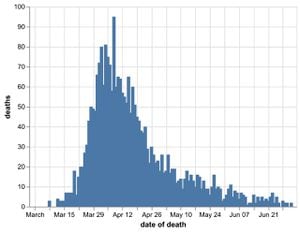
But the national lockdown and other measures to try and limit the spread have calmed the crisis.
There were three separate days last week where no coronavirus deaths were reported in the Black Country and Staffordshire.
Deaths and cases have been gradually falling to the point where, when there are deaths in the region, they are mostly in low single figures.
Wolverhampton Council says over the last week its infection rate is nine per 100,000 people, compared to 147 for Leicester, with officials clear that there is no reason to panic.
But the data was released at a crucial time.
Saturday saw the biggest ease in restrictions since lockdown was enforced in March as pubs, restaurants and hairdressers reopened their doors.
More people are getting in taxis, on buses and trains.
Despite the social distancing measures and precautions in place, the move naturally increases the risk of accelerating the spread of coronavirus, and officials will be keeping an eye firmly on the data over the next couple of weeks.
That time lag is another key consideration. Any impact of the return of pubs and other businesses wouldn't be felt for a few weeks, as people have to catch the virus, report their symptoms and seek treatment before it feeds into the system.
And while track and trace has increased over recent months the fact the Government's much-talked-about app that was supposed to be the gamechanger never materialised is a cause for concern.
But in this sense, Wolverhampton and Dudley should be no different to anywhere else in England. We're all in the same boat.
John Denley, director of public health at Wolverhampton Council, said: "We are aware that the King's College London Covid-19 Symptom Study suggests there may be an increase in Covid-19 cases in Wolverhampton.
"This particular study makes use of a limited range of available datasets and as such it is not a locally or nationally agreed mechanism for predicting coronavirus trends.
"We are able to access a much broader range of datasets related to coronavirus activity, and this suggests that cases of Covid-19 in Wolverhampton have remained low and stable over the last month.
"Over the last seven days our total positive case detection rate has been nine per 100,000 of our population. This is the 48th highest in the country, and much lower than the rate seen in Leicester which was 147 cases per 100,000 people over the same period. As such, we don’t envisage there being a need for a lockdown as has been the case in Leicester at this time – so long as we continue to keep the infection rate low.

"We also collect symptom tracking data from our care homes and schools, which is not widely available, and we are pleased to say that we are not seeing any signs of an increase in symptom reporting in these sectors. We will continue to use a range of data sources to review coronavirus activity in the city as part of our Covid-19 Outbreak Control Plan which aims to reduce the spread of coronavirus and help people safely return to normal life."
Clive Wright, Covid-19 Regional Convenor for West Midlands, said infection rates were declining.
Mr Wright, speaking at a briefing of the West Midlands Combined Authority, said: “Levels of coronavirus infection have been coming down and the Government has acted and eased the restrictions.
“Test, trace, contain and enable is being led by local councils – this relies on testing anyone who has symptoms and if someone has the disease, we will be following up on that.
“Public Health England will monitor the results in the region every day and will work with the directors of public health from each council to prevent any outbreaks.
Mr Wright said there had been small outbreaks of the virus across the region which had been handled effectively.
“There have been some small outbreaks in the West Midlands and they’ve been brought under control," he said.
“The faster we act the more effective test and trace will be – it’s important we all play our part and we need to best this virus together and build on the resilience demonstrated by the public.
Councillor Nicholas Barlow, cabinet member for health and adult social care in Dudley, said: “We have always had a proactive approach to safeguarding public health in Dudley and from the very beginning of the pandemic encouraged our residents to sign up to the national covid symptom checker. However, this relies on people contributing data and as such doesn’t give the full picture for Dudley.
"Only 2,196 people have signed up in the borough and as this was the data used for the King's College London Covid-19 Symptom Study, it certainly does not reflect the much more positive situation in which we fortunately find ourselves.
“While we welcome all evaluation of data to help us better manage the pandemic nationally, thanks to a range of measures and the co-operation of our residents we have actually seen a decline in confirmed cases in Dudley recently. In the past two weeks our current rate has declined to just 2.2 cases per 100,000 of our population."
Councillor Jasbir Jaspal, Wolverhampton Council’s cabinet member for public health and wellbeing, warned people must continue to behave sensibly.
She said: “If we were to let down our guard and allow the virus to begin spreading more easily, we risk not only a second wave of cases and more deaths, but also the re-imposition of lockdown measures as we have seen in Leicester.
“We need to do all we can to ensure that we avoid a local lockdown in Wolverhampton, and we all have a key role to play in this.”

